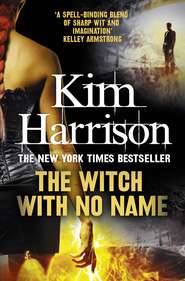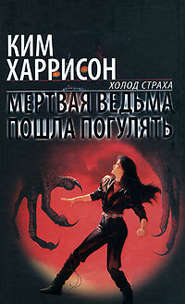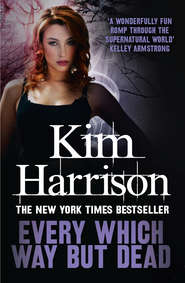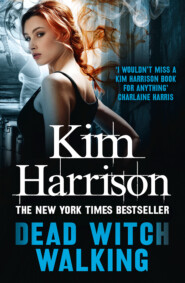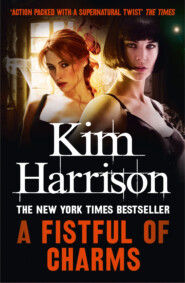По всем вопросам обращайтесь на: info@litportal.ru
(©) 2003-2024.
✖
Where Demons Dare
Автор
Год написания книги
2018
Настройки чтения
Размер шрифта
Высота строк
Поля
I shrugged, running my finger against the thump-bump of the chain-link fence surrounding Keasley’s yard as I walked. “I don’t know. To prove he knew something I didn’t? Did Jih tell you that she’s shacked up with a pixy buck?”
“What!”
His wings stopped and my palm darted out with a flash of adrenaline, but he caught himself before he could drop into my palm. Jenks hovered, his face a mask of parental horror. “Trent?” he squeaked. “Trent told you?” And when I nodded, he turned his gaze to the front gardens of the house, just starting to show the grace of a pixy presence even in the fall. “Sweet mother of Tink,” he said. “I have to talk to my daughter.”
Without waiting for my reply, he darted away, only to jerk to an abrupt halt at the fence. Slipping several inches in height, he yanked a pixy-size red bandanna from a pocket and tied it about his ankle. It was a pixy’s version of a white flag: a promise of good intention and no poaching. He’d never worn it before when visiting his daughter, and the acknowledgment of her new husband had to be bittersweet.
His wings a dismal blue, he zipped over the house to the backyard where Jih had been concentrating her efforts on building a garden.
Smiling faintly, I raised a hand to Keasley’s hail, opened the gate, and entered the yard.
“Hi, Keasley,” I called, looking him over with a new interest born of knowing his history. The old black man stood in the middle of his yard, his cheap sneakers almost hidden by leaves. His jeans were faded by work, not distressing stones in the wash, and his red-and-black plaid shirt looked a size too big, probably gotten at discount somewhere.
His wrinkles gave his face texture that made his expressions easy to read. The tinge of yellow in his brown eyes had me worried, but he was healthy apart from old age and arthritis. I could tell that he’d once been tall; now, though, I could look him eye to eye. Age was beating hard upon his body, but it had yet to touch his mind. He was the neighborhood wise old man and the only one who could give me advice without triggering my resentment.
But it was his hands that I liked the most. You could see how he had lived his entire life in them: dark, spare, knobby with stiffness, but not afraid of work, able to stir spells, stitch vampire bites, and hold pixy children. He had done all three in my sight, and I trusted him. Even if he was pretending to be something he wasn’t. Didn’t we all?
“Good afternoon, Rachel,” he called, his sharp gaze coming back from the roofline and Jenks’s disappearing trail of pixy dust. “You look like a piece of autumn in that sweater.”
I glanced down at the black-and-red pattern, never having thought about it before. “Thanks. You look good out here raking. Your knees doing okay?”
The old man patted the worn spots, squinting in the sun. “They’ve been better, but they’ve been a lot worse, too. Ceri’s been in the kitchen a lot lately, trying things out.”
I slowed, my feet still on the cracked walk to the front porch. Grass had encroached upon it until it was only eight inches wide. “I suppose,” I said softly, “chasing bad guys all your life can really damage a person. If they aren’t careful.”
He didn’t move, going still as he stared at me.
“I, uh, talked to someone today,” I said, wanting to hear it from him. “He said—”
“Who?” he rasped, and my face lost its expression. He was frightened. Terrified, almost.
“Trent,” I said, pulse quickening as I came forward. “Trent Kalamack. He acted like he’s known for a long time.” My shoulders tensed, and the dog barking nearby made me nervous.
Exhaling long and slow, Keasley replaced his fear with a relief so deep I could just about feel it. “He has,” he said, a shaky hand going over his tight, graying curls. “I have to sit down.” He turned to his house. It needed new shingles and paint in the worst way. “Do you want to sit for a moment?”
I thought about Ceri, then Marshal. Then there was the gargoyle Jenks was going on about, too. “Sure.”
Keasley made his slow way to the sagging porch steps, propping the rake against the rail before easing himself down in stages with a heavy sigh. A basket of cherry tomatoes decorated the railing to be given out for trick-or-treat, and two pumpkins waited to be carved. I gingerly sat beside him, my knees even with my chest. “Are you okay?” I asked hesitantly when he didn’t say anything.
He looked at me askance. “You know how to get an old man’s heart going, Rachel. Do Ivy and Jenks know?”
“Jenks,” I said, guilt pinching my brow, and he raised a hand to tell me it was all right.
“I trust he will keep his mouth shut,” he said. “Trent gave me the means to stage my death. Actually, all he gave me was the DNA-doctored tissue to smear over my front porch, but he knew.”
Gave him tissue? There’s a nice thought. “Then you really are—” My words cut off when his twisted hand landed warningly on my knee. In the street, five sparrows fought over a moth they had found, and I listened to them squabble, hearing in his silence his request that I not even say it. “It’s been over a decade,” I finally protested.
His eyes tracked the birds as one gained the moth and the rest chased the bird across the street. “It doesn’t matter,” he said. “Like a murder charge, the file stays open.”
I followed his gaze to the church Ivy and I shared. “That’s why you moved in across from the church, isn’t it?” I asked, remembering the day. Keasley had saved my life by removing a delayed combustion charm someone had slipped me on the bus. “You figured if I could survive the I.S.’s death contract, you might find a way, too?”
He smiled to show his yellowing teeth, and he pulled his hand from my knee. “Yes, ma’am. I did. But after seeing how you did it?” Keasley shook his head. “I’m too old to fight dragons. I’ll stay Keasley, if you don’t mind.”
I thought about that, cold despite the sun on us. Becoming anonymous was just something I couldn’t do. “You moved in the same day I did, didn’t you? You really don’t know when Ivy rented the church.”
“No.” His eyes were on the steeple, the top hidden behind the trees. “But I watched her patterns close that first week, and I’m guessing she’d been there for at least three months.”
My head was going up and down. I was learning a lot today. None of it comfortable. “You’re a good liar,” I said, and Keasley laughed.
“Used to be.”
Liar, I thought, and then my mind drifted to Trent. “Uh, is Ceri up? I have to talk to her.”
Keasley shifted to look at me. In his tired eyes was a deep relief. I had learned his secret and freed him of the necessity to lie to me. But what I think he was the most grateful for was that I didn’t think any less of him for it.
“I think she’s asleep,” he said, smiling to tell me he was glad I was still his friend. “She’s been tired lately.”
I’ll bet. Giving him a smile, I stood and tugged my jeans straight. I’d long assumed that Ivy had moved in before me, having only pretended to move in the same day to ease my suspicions. Now that I knew the truth, I might confront Ivy about it. Maybe. It didn’t necessarily matter—I understood her reasons, and that was enough. Sometimes, just let sleeping vamps lie.
I extended a hand to help Keasley rise. “Will you tell Ceri I came over?” I asked as I held his arm until I knew he had his balance.
The porch creaked behind us, and I whipped my head around. Ceri was standing behind the closed screen door, in a sweaterdress that made her look like a young wife from the sixties. A jumble of emotions hit me as I took in her somber, guilty stance. She didn’t look pregnant. She looked worried.
“Did Jenks wake you?” I said in greeting, not knowing what else to say.
She shook her head no with her arms crossed over her middle. Her long, translucent hair was done up in a complex braid that needed at least two pixies to manage it. Even through the screen I could see her cheeks were pale, her green eyes wide, and her narrow chin raised defiantly. Though delicate and petite, her mind was resilient and strong, tempered by a thousand years of serving as a demon’s familiar. Elves didn’t live any longer than witches, but her life had paused the moment Al took her. My guess was she’d been in her midthirties. She was barefoot, as usual, and her purple dress had black and gold accents. They were the colors that Al made her wear, though admittedly, this wasn’t a ball gown.
“Come in,” she said softly, vanishing into the dark house.
I glanced at Keasley. He had a wary sharpness to him, having read my tension and the shame she was hiding under her defiance. Or maybe it was guilt.
“Go on,” he said, as if wanting us to get this over with so he’d know what was the matter.
Leaving him, I went up the stairs, my tension easing as the shelter of the house accepted me. I didn’t think she’d told him yet—which meant I’d been seeing guilt.
The screen door squeaked, and now, knowing Keasley’s past, I was sure the lack of oil was intentional. The scent of redwood struck me as I followed the sound of her fading steps down the low-ceilinged hall, past the front room, the kitchen, and all the way to the back of the house and the sunken living room, added on at some point.
The older house muffled outside sounds, and I stood in the middle of the back living room. I was sure this was where she had gone. My gaze traveled over the changes she’d made since moving in: asters arranged in Mason-jar vases, live plants bought off the sale rack and nurtured back to health clustered at the lace-curtained windows, bits of ribbon draped over mirrors to remind wandering spirits not to cross into them, yellowed doilies bought at yard sales decorating the padded arms of the couch, and faded pillows and swaths of fabric disguising the old furniture. The combined effect was clean, comfortable, and soothing.
“Ceri?” I finally called, not having the slightest idea where she was.
“Out here,” she said, her voice coming from beyond the door, which was propped open with a potted fig tree.
I winced. She wanted to talk in the garden—her stronghold. Great.
Gathering myself, I headed out to find her seated at a wicker table in the garden. Jih hadn’t been tending it very long, but between the enthusiastic pixy and Ceri, the tiny space had gone from a scuffed-up scrap of dirt to a bit of paradise in less than a year.
An old oak tree thicker than I could get my arms around dominated the backyard, multiple swaths of fabric draped over the lower branches to make a fluttering shelter of sorts. The ground under it was bare dirt, but it was as smooth and flat as linoleum. Vines grew above the fence to block the neighbors’ view, and the grass had been allowed to grow long past the shade of the tree. I could hear water somewhere and a wren singing as if it were spring, not fall. And crickets.






